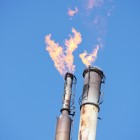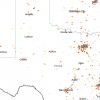Background
Poisoned Places is a special investigative report by NPR, the Center for Public Integrity (CPI) and StateImpact examining how air pollution is affecting communities across the nation. It has been 31 years since Congress passed the Clean Air Act, which directs the Environmental Protection Agency to enforcer regulations and protect the general public from toxic emissions. But as the investigative series discovered, companies are still producing toxic emissions, and regulators are having a difficult time stopping them. The team found:
- State and federal regulators take months and sometimes years to enforce anti-pollution rules. About 400 facilities are on an internal EPA watch list that includes serious or chronic Clean Air Act violators that have not been subject to timely enforcement. The list was obtained by the Center and NPR and is being made public for the first time.
- More than 1,600 facilities around the country are classified by the EPA as “high priority violators” of the Clear Air Act sites in need of urgent action by enforcers. Nearly 300 have had this designation for at least a decade.
- Regulators largely rely on an honor system easily manipulated by polluters, which report their own emissions. Even judging by the self-reported numbers, the scale of pollution is enormous: At least 600 million pounds of toxic chemicals – including arsenic, benzene, formaldehyde and lead – were released into the air in 2009, according to EPA data.



